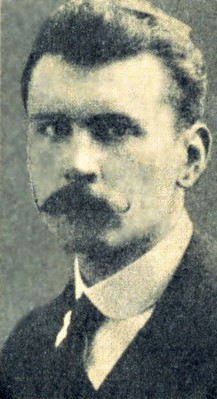
Nikolay Sergeyevich TRUBETSKOY (16. 04. 1890, Moscow — 25. 01. 1938, Vienna) — Russian linguist and philosopher. Trubetskoy was a member of one the noblest families in Russia. His father was rector of Moscow University and his brother Eugeny was a well-known religious thinker. From the age of 15 he published a number of works on Finno-Ugrian folklore. In all he learned more than 12 ancient and live languages. In 1913 he went to Leipzig University to study Indo-European Comparative Linguistics. In 1915 he became an Associate Professor at Moscow University. His thesis on (Pre) History of languages was lost during the evacuation in 1919. Trubetskoy left Russia in 1920, and taught his course in Comparative linguistics in the University of Sophia. After he moved to Prague, he became a central figure of the Prague School of Linguistics, and was noted as the author of its most important work on phonology: 'Grundzüge der Phonologie' ['Principles of Phonology'] (1939). From 1922 he lived in Austria, where he became Head of Slavic linguistics at Vienna University. There he taught more than 100 courses and published about 150 works.
He died tragically at the age of 47. The draft of his book On the Pre-History of Slavic Languages was confiscated and destroyed by the Gestapo in 1938 and his most famous book was eventually published after the death of its author. Trubetskoy was one of the most important linguists of his time; he was influenced by Saussure and in turn influenced Roman Jakobson.
Trubetskoy does not consider writing to be the key element of language. That is why he turns to the reconstruction of oral language, which appears to be the origin and source of writing and thinking. The idea of 'origin' and truth-into-speech was criticized by Derrida, and Derrida's term (archi)écriture contrasts with Trubetskoy's Pre-History. Derrida tries to show that in Trubetskoy's linguistics writing is misunderstood as a secondary lingual practice; in reality there is no original oral (pre-historic) language and secondary writing history, because the two cannot be separated. We can reconstruct ancient speech through written texts only, just as pre-history can only be understand with the help of historical sources. Derrida criticizes Trubetskoy as the representative of the phonological orientation in linguistics; he writes, 'Phonology, it is often said today, communicates its scientificity to linguistics, which in turn serves as the epistemological model for all the sciences of man'. (De la grammatologie. Paris: Minuit, 1967. — p. 146). Trubetskoy was a disciple of Saussure's project, and wanted linguistics to be the science of language. There is no doubt that Trubetskoy's linguistic ideas were more prolific and important for world philosophy than his philosophical researches of spirituality and the Asian origin of the Russian nation.
-=-
Trubetskoy N. Europe and Humankind. Sophia, 1920;
Trubetskoy N. Tchingiz-khan. The Glance to Russian History not from the West, but from the East. Berlin, 1925;
Trubetskoy N. To the Problems of Russian Self-Cognition. Paris, 1927;
Trubetskoy N. Foundations of Phonology. Moscow, 1960;
Trubetskoy N. Selected Works in Philology. Moscow, 1987; Troubetzkoy N. Essais sur le langage. Paris, 1968;
-=-
© Dmitry A. Olshansky, M.A. in Philosophy (St. Petersburg)
E-mail: olshansky@hotmail.com
